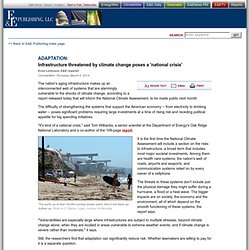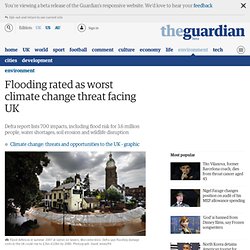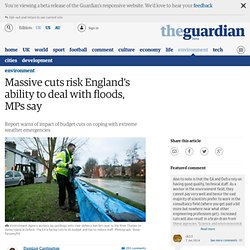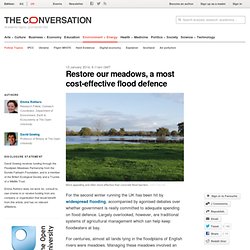

Military 'may have to abandon flood-prone bases' Adapting Archaeology: Foresight for Climate Change in the UK. The Adapting Archaeology conference was held at the British Academy on 10 July 2007.

It brought together seventy archaeologists from organisations around the UK to explore forward-thinking on the likely effects of climate change for the historic environment and how archaeology and conservation need to adapt to meet this new challenge. An introduction by Dr Gill Chitty, Head of Conservation at CBA is followed by summaries of each paper with links to Powerpoint presentations and associated references and concludes with a report by Rowan Whimster. Quick Download. ADAPTATION: Infrastructure threatened by climate change poses a 'national crisis' Advertisement The nation's aging infrastructure makes up an interconnected web of systems that are alarmingly vulnerable to the shocks of climate change, according to a report released today that will inform the National Climate Assessment, to be made public next month.

Flooding rated as worst climate change threat facing UK. Flooding is the greatest threat to the UK posed by climate change, with up to 3.6 million people at risk by the middle of the century, according to a report published on Thursday by the environment department.

The first comprehensive climate change risk assessment for the UK identifies hundreds of ways rising global temperatures will have an impact if no action is taken. They include the financial damage caused by flooding, which would increase to £2bn-£10bn a year by 2080, more deaths in heatwaves, and large-scale water shortages by mid-century. Unusually for such documents, it also highlighted ways in which the country could benefit from milder winters and drier summers, such as fewer cold-related deaths, better wheat crops and a more attractive climate for tourists. "If you had to pick one particular issue I think the flooding issue is the most dominant," said Sir Bob Watson, chief scientist at the Department for Environment, Food and Rural Affairs. Copenhagen pilot. Drowning in money: the untold story of the crazy public spending that makes flooding inevitable. We all know what's gone wrong, or we think we do: not enough spending on flood defences.

It's true that the government's cuts have exposed thousands of homes to greater risk, and that the cuts will become more dangerous as climate change kicks in. But too little public spending is a small part of the problem. It is dwarfed by another factor, which has been overlooked in discussions in the media and statements by the government: too much public spending. Vast amounts of public money, running into billions, are spent every year on policies that make devastating floods inevitable. Massive cuts risk England's ability to deal with floods, MPs say. "Massive" and ongoing cuts to the budget of the department of environment, food and rural affairs mean its ability to respond to emergencies such as flooding is in danger, according to a report by MPs published on Tuesday.

"Recent flooding events reinforce our concerns about cuts to the Defra budget. It is a small ministry facing massive cuts," said Anne McIntosh, Conservative MP and chairman of the Efra select committee. FCERM flooding statement: 17th January 2014. UK floods: council declares major incident on Somerset Levels. A major incident has been declared on the flood-hit Somerset Levels after more heavy rain poured on to saturated ground and into full water courses.

Sedgemoor district council said it feared that communities already struggling to cope with weeks of flooding would be hit by further rain. The Avon and Somerset police chief constable, Nick Gargan, has been briefed on the situation and national resources such as large pumps are ready to be deployed. Homes and communities on the Levels remain cut off and around 17,000 acres of land lie underwater a month after the flooding began. The council's chief executive, Kerry Rickards, said: "Several Sedgemoor communities have been severely affected by the floodwaters for some weeks now. With significant rainfall expected over the coming days we feel this situation needs to be escalated as a major incident. " UK floods: MoD steps in to send army to Somerset Levels. The government is to send in the army to help tackle the floods in the Somerset Levels.

The Ministry of Defence is to deploy equipment and manpower to help those in affected areas by delivering food, transporting people and distributing sandbags. An MoD spokeswoman said : "We have tonight deployed military planners to help Somerset county council determine what support they might need. " Dredging rivers won't stop floods. It will make them worse. Restore our meadows, a most cost-effective flood defence. For the second winter running the UK has been hit by widespread flooding, accompanied by agonised debates over whether government is really committed to adequate spending on flood defence.

Largely overlooked, however, are traditional systems of agricultural management which can help keep floodwaters at bay. For centuries, almost all lands lying in the floodplains of English rivers were meadows. Managing these meadows involved an annual hay cut followed by grazing, providing essential hay feed for livestock over winter. Nutrient-rich silts deposited on the meadows by regular flooding acted as natural fertiliser, leaving them reliably productive. But over the past 70 years, the vast majority of these meadows have been lost to housing development, gravel extraction and quarrying, water abstraction, changes in agricultural use, or just lack of management. Climate engineering ideas no longer considered pie in the sky. WASHINGTON — As international efforts to reduce greenhouse gas emissions stall, schemes to slow global warming using fantastical technologies once dismissed as a sideshow are getting serious consideration in Washington.

Successful first test for Venice Mose project floodgates. Venice has carried out the first successful tests on a new flood barrier system designed to save the historic Italian city from rising tides.

The Mose project – adapted in English to Moses after the biblical prophet who parted the Red Sea – put its head above water as four large floodgates rose from the depths in the east of the lagoon. The mayor of Venice described it as a very important and moving moment – the first major test for a project involving 50 companies that has cost over five billion euros. How To Rebuild Venice, Using Programmable Water Droplets. The foundations of Venice are sinking into the city's own brackish lagoon. Built upon piles of hard alder wood that sat in water underneath sand, mud, and clay for hundreds of years, Venice has been slowly slumping back into the earth, a phenomenon aggravated by the city's groundwater extraction and weight gain during the last century.
Sea level rise is also an ongoing issue for a city that floods four to five times a year. But while officials install 78 robotic gates to keep the Venetian lagoon protected from the Adriatic Sea during high tides, a separate group of researchers have been working on a radical project to rebuild the city, droplet by droplet, from its underwater foundations up. Rachel Armstrong is a futurist thinker and architect who believes that Venice can be fortified with a unique “living architecture.” In December, for the first time, Armstrong and a colleague set about characterizing what these “protocells,” as they’re called, might be capable of in a lab.
Reducing My Flood Risk « National Flood Forum. Protecting your property is a key part of helping to reduce the impact of flooding on your home or business. Environment Agency - Risk of Flooding from Rivers and Sea. Natural defences can best protect coasts. Jon Woodruff and Christine Brandon survey sediments after Superstorm SandyImage: Courtesy of UMass Amherst By Tim Radford Many shorelines around the world are at risk – not just from extreme weather, but from far more gradual threats. And often the best protection comes from nature. LONDON, 5 December – It isn’t just the catastrophic storms and tropical cyclones that threaten disaster for the world’s coastal cities. Simple, insidious things like sea level rise, coastal subsidence and the loss of wetlands could bring the sea water coursing through city streets in the decades to come. Jonathan Woodruff of the University of Massachusetts Amherst in the US and colleagues report in Nature that shorelines are increasingly at risk, and humans must adapt and learn to live with increasing hazard.
Many of the world’s great cities are on low-lying coastal plains, or on river estuaries, and are therefore anyway at risk as sea levels rise because of global warming. Flood defenders go back to nature to keep vulnerable homes dry. After the torrential rain of Christmas Eve, logs stacked outside Helen Webber and John Hesp's thatched cottage were washed away down the lane. The rust-red river that surges past their 400-year-old home in the north Somerset village of Bossington was rising rapidly, and automated alarm calls by phone had awoken them in the early hours. The couple have endured the misery of being flooded three times in last 20 years. But this time, despite the extreme downpour, the river did not burst its banks and their home was saved.
"It was a narrow escape," says Webber, who remembers well the trauma of previous floods. "It is really horrible, everything smells and is dirty and you have to chuck a lot of stuff away. Webber's home, and 100 others nearby, are now protected by a radical landscape experiment that passed its first severe test during the recent weeks of extreme weather.